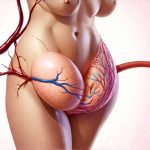Menstruation is an incredibly personal experience, varying widely among individuals in terms of symptoms and intensity. While often associated with uterine cramping and emotional fluctuations, many people don’t realize the significant impact hormonal shifts have on the entire digestive system. These changes aren’t merely side effects; they are a natural consequence of the body preparing for potential pregnancy, influencing everything from gut motility to appetite and even microbiome composition. Understanding these connections can empower individuals to better manage their wellbeing during this cyclical process and recognize when symptoms might require further exploration with a healthcare professional.
The fluctuating levels of estrogen and progesterone throughout the menstrual cycle directly influence digestive function. Estrogen generally increases gut motility – speeding up digestion – while progesterone tends to slow it down. This dynamic creates predictable shifts in bowel habits, often leading to constipation before menstruation and more frequent bowel movements during or after. Beyond bowel regularity, hormones impact gastric emptying rates, nutrient absorption, and even the sensitivity of the digestive tract, making some people experience bloating, nausea, or altered food tolerances at specific times of their cycle. It’s important to note that these experiences are incredibly individual; what one person feels strongly may be barely noticeable for another.
Hormonal Influences on Digestive Processes
The menstrual cycle is orchestrated by two primary hormones: estrogen and progesterone. Their levels rise and fall in distinct phases, creating a cascade of effects throughout the body, including the digestive system. Estrogen’s peak during the follicular phase (from menstruation to ovulation) generally encourages increased gut motility, leading to faster digestion and potentially looser stools. This can be beneficial for some, but also contribute to diarrhea or urgency in others. Conversely, progesterone levels rise significantly after ovulation during the luteal phase, causing a slowing down of digestive processes. This slower transit time can lead to constipation, as waste products remain in the colon for longer periods.
The interplay between these hormones isn’t always straightforward. Factors like stress, diet, and individual sensitivity play crucial roles. For instance, someone experiencing high levels of stress may have an exacerbated progesterone effect, leading to more pronounced constipation. Additionally, a diet low in fiber or hydration can worsen constipation symptoms, regardless of hormonal influences. It’s also worth considering that the gut itself contains estrogen receptors, meaning it directly responds to these hormonal changes – making the digestive system particularly sensitive to fluctuations throughout the cycle.
Understanding this hormonal dance is key to proactively managing digestive discomfort. Recognizing when specific symptoms are likely to occur based on your cycle phase can help you adjust your diet and lifestyle accordingly. For example, increasing fiber intake during the luteal phase might counteract progesterone-induced constipation, while staying well-hydrated can further support healthy bowel function. You may even benefit from digestive assessments to understand your body’s response.
Common Digestive Symptoms & Cycle Phases
Digestive issues frequently reported during menstruation aren’t always about changes in bowel habits alone. Bloating is perhaps the most common complaint, often starting a few days before menstruation and peaking during the first few days of bleeding. This bloating isn’t necessarily related to gas production but more often stems from water retention caused by hormonal shifts. Nausea can also be prominent, even without vomiting, particularly in the pre-menstrual phase or during the first day of bleeding. Some individuals experience increased sensitivity to certain foods, leading to discomfort after consuming things they normally tolerate well.
Diarrhea is also a possibility, particularly around ovulation when estrogen levels peak and gut motility increases. Conversely, constipation is more common in the luteal phase as progesterone slows digestion. The severity of these symptoms varies greatly; some individuals experience only mild discomfort while others find it significantly disruptive to their daily lives. It’s crucial to differentiate between normal cyclical changes and persistent digestive issues that might indicate an underlying condition. If symptoms are severe, debilitating, or accompanied by other concerning signs like blood in the stool or significant weight loss, seeking medical evaluation is vital. Knowing checkpoints can help you decide when to seek care.
Dietary Strategies for Digestive Comfort
Managing digestive shifts during menstruation often begins with mindful dietary choices. Here’s a breakdown of helpful strategies:
- Increase fiber intake: Especially during the luteal phase to combat constipation. Good sources include fruits, vegetables, whole grains, and legumes.
- Stay hydrated: Water helps soften stool and promotes regular bowel movements. Aim for at least 8 glasses of water per day.
- Limit processed foods, sugar, and caffeine: These can exacerbate bloating and digestive upset.
- Consider anti-inflammatory foods: Foods like ginger, turmeric, and fatty fish may help reduce inflammation and alleviate discomfort.
- Smaller, more frequent meals: Can ease digestion and prevent overwhelming the system.
It’s also helpful to track your food intake alongside your cycle to identify potential trigger foods or patterns. For instance, you might notice that dairy products exacerbate bloating during certain phases of your cycle. This personalized approach allows you to tailor your diet to minimize digestive discomfort. If menstrual cycles cause significant bloating, consider foods known to reduce inflammation.
The Gut-Brain Connection & Menstrual Cycles
The gut and the brain are intimately connected via what’s known as the “gut-brain axis”. This bidirectional communication system means that changes in one area can significantly impact the other. During menstruation, hormonal fluctuations not only affect digestion but also influence mood, stress levels, and even cognitive function. Increased stress or anxiety can worsen digestive symptoms, while a healthy gut microbiome has been linked to improved mental wellbeing.
- Probiotics: Consuming probiotic-rich foods (yogurt, kefir, sauerkraut) or taking a probiotic supplement may help support a balanced gut microbiome.
- Stress management techniques: Practices like yoga, meditation, and deep breathing exercises can help reduce stress levels and improve digestive function.
- Mindful eating: Paying attention to your body’s hunger cues and savoring each bite can promote better digestion and reduce bloating.
Prioritizing mental wellbeing is just as important as dietary changes. Creating a supportive environment for both physical and emotional health can significantly enhance overall wellbeing during menstruation. Travel can sometimes exacerbate these issues, so planning ahead is useful.
When to Seek Medical Advice
While digestive changes are generally normal during the menstrual cycle, certain symptoms warrant medical attention. If you experience:
- Severe or persistent abdominal pain: Especially if accompanied by fever or vomiting.
- Significant blood in the stool: Could indicate a more serious underlying condition.
- Unexplained weight loss: May signal a digestive disorder.
- Changes in bowel habits that don’t resolve after menstruation: Could be indicative of Irritable Bowel Syndrome (IBS) or other conditions.
- Debilitating bloating or nausea: That significantly interferes with your daily life.
Don’t hesitate to consult a healthcare professional to rule out any underlying medical issues and receive personalized guidance. A doctor can help determine if your symptoms are related to the menstrual cycle or require further investigation. Remember, self-diagnosis is never recommended. Seeking expert advice ensures you receive appropriate care and support for your individual needs. In some cases, diagnostics may be needed to rule out other conditions. Consider a rectal exam if you have concerns. Finally, remember how seasonal changes can affect your digestion too.


















